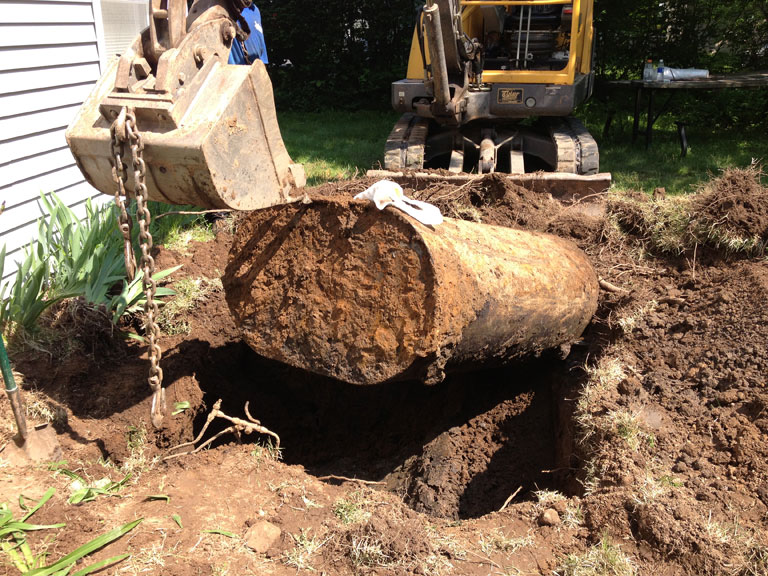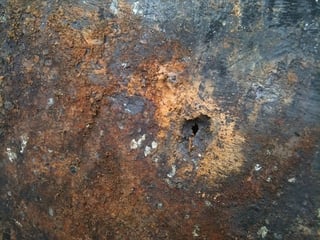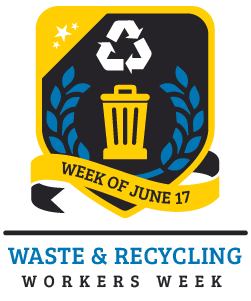Demolition of a residential home located at 6768 Bakersfield Dr. was completed for the City Of Jackosnville Fire Department. Arwood Waste performed the Demolition of the residential home, driveway and buried fuel tank.

6768 BAKERSFIELD Dr.
Why do underground heating oil tanks corrode?
A2. Corrosion is caused by the inherent tendency of iron based metals that most all heating oil underground storage tanks are comprised of, to revert to a stable form. This stable form is what you know as rust. When and how fast steel turns to rust is dependent on a wide variety of variables such as soil moisture, pH acidity, backfill material, physical location of the tank, the thickness of the tank, amount of water in the tank, age of the tank and any scratching or damage occurring during the tank’s installation.
Rust never sleeps and eventually all steel tanks will corrode and leak, maybe next week, maybe 20 years from now.
Are residential underground heating oil tanks regulated by the law?
A3. If you have an underground home heating oil tank installed at a residential property, your tank is exempt from Federal Regulations. Should a home heating oil tank release oil into the environment, then at that point the owner of the tank is no longer exempt from the provisions of environmental regulation governing uncontrolled discharges or releases into the environment. At the time it is discovered that an oil tank has leaked, the property owner would need to take reasonable measures to address the source of the leak/spill and prevent it from spreading and the incident reported to the appropriate agency. In New Jersey the governing agency is the New Jersey Department of Environmental Protection, (NJDEP) not the Environmental Protection Agency, (EPA) which is a Federal agency and does not have immediate jurisdiction for these types of incidents. If a heating oil discharge has occurred at your home, regardless of the quantity, the owner is required to report the leak to the New Jersey Department of Environmental Protection (NJDEP). Calling the NJDEP’s toll free 24 hour Environmental Action Hot Line at 1-877-WARN DEP (1-877-927-6337) as soon as a leak is discovered. After discovery of the tank leak, a subsurface investigation (soil borings and testing) would have to be completed and contingent on the petroleum levels appropriate corrective action (i.e., cleanup/remediation) would need to be initiated to address the tank leak
Why are underground heating oil tanks a concern?
A1. Historically, petroleum products have been stored in steel Underground Storage Tanks, (UST’s). These steel tanks have a finite life expectancy (rust never sleeps) and when corrosion holes breach the tank shell or the welded seams of the tank fail, petroleum will leach into the environment. In response to both state and federal environmental requirements and emerging technology’s, replacement of single wall steel UST’s have become a growing trend in order to remove the environmental liabilities associated with Leaking Underground Storage Tanks, (LUST’s). Buried heating oil tanks raise a variety of environmental, safety, legal and economic concerns for home owners and home buyers. The largest concerns relating to environmental issues are heating oil leaks that cause soil or groundwater contamination. Economic issues consist of the cost and risks associated with testing, tank removal and site cleanup.
Jacksonville FL 32210
The director of the Jacksonville Fire and Rescue Department oversees a department with over 1,300 firefighters and emergency medical personnel. The department provides service to about 850,000 people living in Jacksonville, which covers about 840 square miles.
If you recently received emergency services from the Jacksonville Fire and Rescue Department, you are eligible to take our Customer Satisfaction Survey. To begin, click on the survey icon. Please note you must complete and submit the survey the first time you open the link. Any concerns, questions, suggestions or comments you may have pertaining to these JFRD pages should be directed to [email protected] or [email protected]





